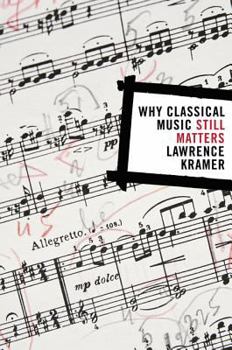Why Classical Music Still Matters
Select Format
Select Condition 
Book Overview
"What can be done about the state of classical music?" Lawrence Kramer asks in this elegant, sharply observed, and beautifully written extended essay. Classical music, whose demise has been predicted... This description may be from another edition of this product.
Format:Hardcover
Language:English
ISBN:0520250826
ISBN13:9780520250826
Release Date:May 2007
Publisher:University of California Press
Length:242 Pages
Weight:0.90 lbs.
Dimensions:0.8" x 5.6" x 8.5"
Customer Reviews
1 rating
Why musical meaning still intrigues us
Published by Thriftbooks.com User , 14 years ago
Sure, we enjoy listening to classical music, but why should the music really matter to us? Lawrence Kramer has set himself quite a challenge trying to answer that question, and understanding his argument in this brief but difficult book is no less of a challenge for the reader. The latter is partly a function of Kramer's prose-poetic style: you're invited to negotiate 226 pages of such passages as "Regardless of the specific analogies involved, thinking about the performer or performance in the sense of creative reproduction and worldly activity takes us into the wider field of human performances, both symbolic and material, and therefore into the realms of action, desire, social condition, and the vitality of experience." Philosophical arguments about aesthetic value are notoriously difficult to follow in any event; it comes with the territory. While Kramer has only good things to say about jazz and pop music, he locates a reflexive, ambivalent individualism -- the product of Enlightenment values and a fundamental condition of modernity -- in "classical" music, here identified with European art music from Bach to Ligeti. If the burden of creativity in jazz and pop lies almost entirely within the power of the performer (or arranger), the classical score is a symbol, a notional concept of music; the actual music is created by the subjective listener, in close collaboration with the composer and the performer(s). Far from being "timeless", classical music is provisional; it exists only in the hearing of the listening subject, and so the music has different meanings in different contexts, from the concert hall to the movie soundtrack. Kramer's summary chapters on musical value bookend the essay, whose individual chapters focus on melody, which enacts a journey through experience; on score and performance, or the musical expression of emotions that we can't, or won't, put into words (Kramer's examples drawn from Hollywood movies are persuasive here); on art songs of loss and defiance, and the life-affirming process of finding meaning in them; on the paradox of classical piano music, which centers on a machine designed for players to embody mind and spirit, both their own and the composer's; and finally, a chapter on how art music creates a sense of cultural memory, a critical and reflexive sense that transcends mere nostalgia. This is by no means an easy book to read, but I finished it with a richer sense of what this music has to offer to the engaged listener: the stimulation of a wider imaginative freedom, with which to better grasp the relation of [musical] work to world. And if classical music still matters, that's not too much to ask of it.





